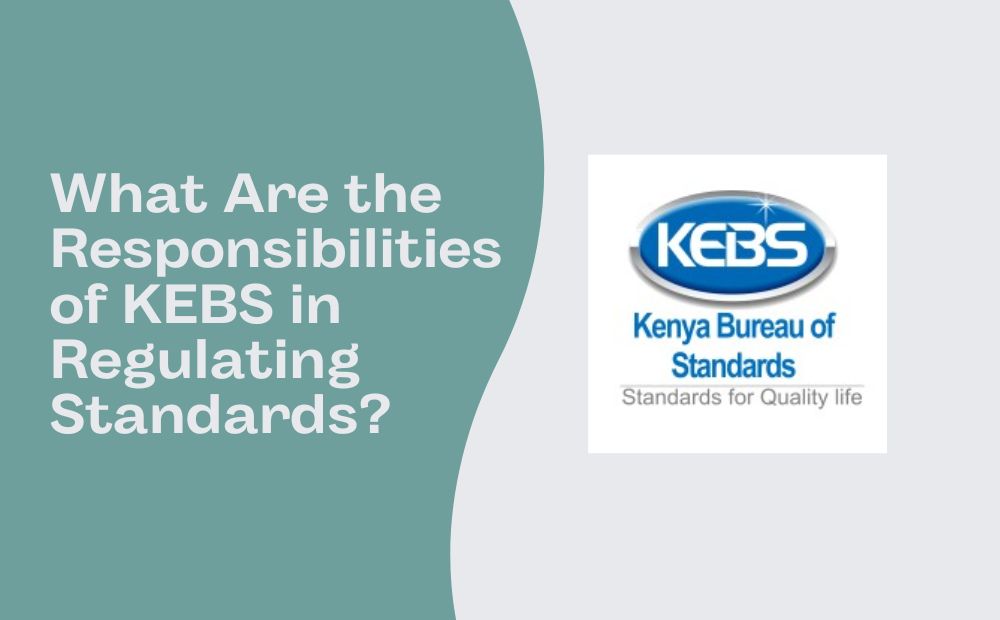The welfare of consumers and the economy in Kenya depend on the maintenance of high standards for goods and services. An essential part in establishing and upholding these standards is the Kenya Bureau of Standards (KEBS). This blog post discusses KEBS’s many duties and how it makes sure companies follow the necessary safety and quality requirements.
Overview of KEBS
KEBS stands for the Kenya Bureau of Standards. Established by the Kenyan government, its main goal is to promote standardization and quality assurance in industry, commerce, and public safety. KEBS is not just about enforcing standards; it also involves encouraging and coordinating industrial progress, which boosts economic development across the nation.
Mission and Vision of KEBS
KEBS aims to enhance the quality of life for the public by developing and promoting standards that ensure the safety, quality, and reliability of products and services. Its vision is to be a leading institution in standardization and quality assurance.
Key Responsibilities of KEBS
KEBS has a broad range of responsibilities that cover everything from standards development to ensuring compliance. Here’s a closer look at these critical functions:
Development of Standards
KEBS is responsible for developing, establishing, and promoting national standards. The process of standards development is systematic and involves various stakeholders, including industry experts, consumer groups, and government agencies. These standards help ensure that products and services are safe, reliable, and of good quality.
Certification of Products
One of the primary roles of KEBS is to certify products. This involves conducting tests and inspections to ensure products meet specific standards before they are sold in the market. Product certification is crucial as it not only helps protect consumers from substandard products but also enhances the competitiveness of local products both domestically and internationally.
Quality Assurance
KEBS ensures that manufacturing processes adhere to predefined standards to maintain product quality consistently. This involves regular audits and inspections of production processes to verify that they meet set standards.
Metrology Services
Metrology, the science of measurement, is another critical area managed by KEBS. Accurate measurements are essential in various sectors, including health, manufacturing, and construction, to ensure safety and compliance. KEBS provides calibration and verification services to ensure that measuring instruments used in the industry are accurate and reliable.
Import and Export Inspection
KEBS regulates the quality of all goods entering and leaving the country. It inspects imports to prevent substandard goods from entering the Kenyan market and certifies exports to meet international quality standards, thus protecting the reputation of Kenyan products abroad.
How KEBS Enhances Consumer Protection
Consumer protection is a significant part of KEBS’ responsibilities. Here’s how KEBS ensures that consumers receive products and services that meet the highest standards of quality and safety:
Market Surveillance
KEBS regularly monitors the market to ensure that all products sold comply with the necessary standards. This involves random checks and testing of products available to the public. If products fail to meet the standards, KEBS can enforce actions such as recalls or bans.
Handling Consumer Complaints
KEBS also handles complaints from consumers regarding product quality and standards. It investigates these complaints and enforces necessary measures to rectify issues, thus ensuring consumer rights are upheld.
Public Awareness Campaigns
Educating the public about standards is crucial. KEBS conducts awareness campaigns to inform consumers about the importance of standards and how to identify products that comply with them. This knowledge empowers consumers to make informed choices and demand quality products.
KEBS and International Standards
In a globalized world, adhering to international standards is essential. KEBS collaborates with international standards organizations to align Kenyan standards with global best practices. This alignment ensures that Kenyan products can compete effectively in the global market and that imports meet international quality standards.
Conclusion
KEBS responsibilities in regulating standards are vast and vital for the economic health and safety of Kenya. By developing standards, certifying products, and ensuring continuous compliance, KEBS plays a crucial role in protecting consumers and supporting business competitiveness. As KEBS continues to enforce and enhance standards, it supports the growth of Kenya’s economy and ensures that consumers have access to safe, reliable, and high-quality products.
Note:- For more articles visit on netblogz.
